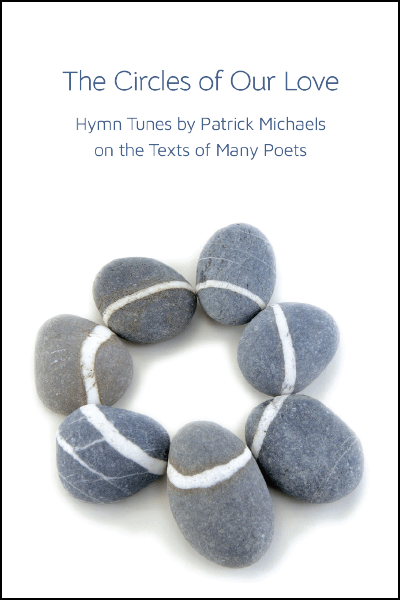|
Author Patrick Michaels
Released 12/22
Catalog no. 125-070
Price $20 (U.S.) |
Pre-Order now! free shipping!
Delivery after December 1


Foreword--C. Michael Hawn
Two characteristics tell you a lot about a tunesmith--the poetic company they keep and the range of interpretive musical approaches they bring to the poets they set. This volume reflects maturity and artistry on both counts. Following From Depths of Love (2015), a collection that features many of Patrick Michaels' own texts and tunes, The Circles of Our Love includes hymn settings composed over two decades that engages over forty-five poets, most of which have been active from the 1980s through the present. Several texts are fresh, coming from this century. Michaels is himself a published hymn-text writer, a skill that sets him apart from many who are proficient in either composing hymn tunes or hymn texts.
Some texts chosen are well known--for example, Fred Pratt Green’s "For the Fruit of All Creation," Jean Janzen's "Mothering God,” and Shirley Erena Murray's "For Everyone Born" (A Place at the Table). Others have been published less frequently--Mary Louise Bringle's "Now the Heaven’s Start to Whisper," Ruth Duck's "When the Wind of Winter Blows," Jane Marshall's "From Miles Around the Sick Ones Came," and Thomas Troeger's "A Cheering, Chanting, Dizzy Crowd."
Still others languish in the poets' single-author collections, only to receive attention now. These include texts by David Bjorlin, John L. Bell, Susan Palo Cherwien, Patricia Blaze Clark, Carl P. Daw Jr., Edith Sinclair Downing, Delores Dufner, David Gambrell, Jacque Jones, Herbert O'Driscoll, Herman Stuempfle Jr., and Rae E. Whitney, to mention only some. In all cases, these lesser-known gems by established authors shine with a beauty all their own. Without a doubt, The Circles of Our Love reflects the exceptional poetic company that Patrick Michaels keeps.
What about the musical attention that he gives each text? Michaels' compositions are not formulaic. The textures range from four-part homophonic and more polyphonic approaches to simple accompaniments supporting the melody. He has the gift of developing a melodic or rhythmic motif and then adding a delightful innovative element that invites the singer to enjoy the tune on successive stanzas. For example, Come Home, set to Adam Tice's "The Mountain of God," alternates between a triplet figure in one measure and a dancing syncopation in the other, capturing the invitation of all earth’s cultures and peoples to "Come home to the city of God." Joyful Rebellion, for David Bjorlin’s "God, Make Us Agents of Joyful Rebellion," employs a delightful 6/8 versus 3/4 meter to portray what may seem like an oxymoron in the title. At other times, Michaels composes in a folk-like quality to convey a biblical narrative such as in Jacque Jones' "Two Young Women Watch Each Other" and Rae Whitney's "O Eve and Adam, I Give You This Garden." A dash of chromatic harmony adds an intriguing flavor to other musical settings such as Delores Dufner's "She Poured the Perfume Lavishly."
Patrick Michaels keeps fascinating poetic company and honors each of them with distinctive musical interpretations. These qualities make this a volume worth savoring.
--C. Michael Hawn
University Distinguished Emeritus Professor of Church Music
Perkins School of Theology, Southern Methodist University
|

Description
A collection of over 45 hymn tunes by Patrick Michaels with texts for all times of the church year and services. Each hymn uses the text of a different author, so it's a hymnary that has a wide variety of styles and topics.
Introduction
I have loved hymns and singing in church since I was little. Growing up as a Roman Catholic, singing in church--much less being heard singing--was sometimes a counter-cultural thing. Still, I enjoyed paging through early missalettes and hymnals and seeing what sort of music people were composing and hoping we would sing. Later, as I worked in the Episcopal Church and became familiar with a wider body of mostly classic and historical hymns, I learned how hymns were put together. (Thank you, Austin Lovelace!) I read books by Erik Routley and others in the university library when I should have been finishing my required schoolwork. I also began writing tunes and eventually texts for my small community of the Episcopal Center on the University of Minnesota campus, when the ones we were provided with seemed dated or inappropriate. My interest grew, especially as I became acquainted with the hymn-poems of Brian Wren and the work of The Hymn Society in the U.S. and Canada. Since that time, I have made it my business to learn as much as I could about hymns and their tunes.
Many years later after a hymn festival given by Richard Leach and myself featuring my tunes for his texts, his publisher, David Schaap, asked me if I might be interested in collecting some of my tunes for a small publication. I, of course, was delighted to say yes. Later, as I was considering how to choose what pieces to include, it was clear that I needed to make a plan or have a theme. Themes eluded me, but I did come up with a plan. Since I had an abundance of tunes for texts written by a great variety of poets, I decided that perhaps I could make a collection featuring one text from each author.
Making that choice of a single text and tune for each author was the next challenge. I tried to choose pieces that would have both the greatest broad appeal: first, by having a text that was useful generally and not appropriate only to a single day of the Church year (there are a few exceptions here); and second, having a tune that is easily learned and memorable. It was difficult to leave out some pieces, but I think this collection is a fair representation of my work.
This collection shows only a tiny sampling of the treasury which these poets have given the church for our spiritual guidance and delight. My hope is that this will be useful and helpful for people in churches and other settings. My further hope is that these pieces will pique the interest of all who encounter them, and lead to further research into the work of these poets--with happy discoveries of new treasures and deeper insights. --Patrick Michaels
|



